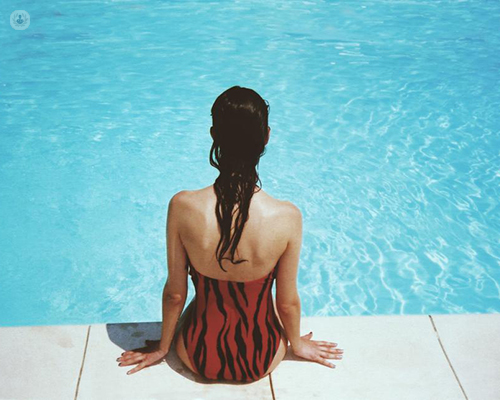How to protect your skin when swimming
Autore:Learning to swim is generally considered essential and is potentially lifesaving. Swimming is also a very good form of exercise and should be part of everybody’s healthy lifestyle. However, swimming pools are often not the safest of places for people with skin conditions and the disinfectants used to keep pools clean can cause skin problems with significant skin irritation and rashes, particularly in those with sensitive skin.
Professor Andrew Wright is a consultant dermatologist and a professor at the University of Bradford who has publicly voiced his concerns about the use of chlorine in swimming pools, including how the chemical is a potent irritant, especially for anyone who already lives with a skin condition and even for those who have asthma. Here, Professor Wright shares his expert advice on how you can reduce the risk of skin irritation when swimming.

How are swimming pools cleaned?
Most pools use a cleansing infiltration system which involves the use of chlorine or similar chemicals. These chemicals react with materials in the water such as dead skin to form so-called chloramines. These chemicals produce the smell that you often associate with chlorinated pools. It is the chloramines that cause skin irritation and discomfort, it is well recognised that they can also make asthma symptoms worse.
A small number of pools use other filtration systems, including ozone-based systems, these pools smell fresh and the water is cleaner and much less likely to irritate the skin. Unfortunately, systems such as these are relatively more expensive to install and operate but are much better systems, particularly for people with sensitive skin.
How to reduce the risks of skin irritation
There are several tips and advice which can be given to help reduce skin irritation, which includes the following:
- Avoid warmer pools, the warmer the water the more disinfectant is needed. The worst pools are obviously hot tubs/Jacuzzis. Spending significant periods of time in hot tubs/Jacuzzis can cause a wide variety of skin problems.
- If you do have sensitive skin or suffer from skin problems, look on the internet to see if any of your local pools use ozone or other low chlorine filtration systems.
- If you are visiting a new pool and you are not sure what system they use don’t spend hours in the water the first time you go.
- Shower on entering and leaving the water and apply moisturiser after showering. If you plan to spend a significant period of time in the water, using swimming as part of your training regime, then come out of the water for a short period time and shower mid-way through.
- One final tip for regular swimmers is to be careful with shampoo and products designed to go on hair and scalp, and not on the body. Always try to wash shampoo out without allowing the water to run down your body. This will significantly help to reduce any irritation that the shampoo can cause to sensitive skin.
If you’re living with skin complaints such as eczema or psoriasis, or feel concerned that you have an undiagnosed skin allergy, you can book an appointment with Professor Wright via his Top Doctor’s profile here.



